人教版高中英语必修5 Unit 2 The United Kingdom Grammar课件(29张PPT)
文档属性
| 名称 | 人教版高中英语必修5 Unit 2 The United Kingdom Grammar课件(29张PPT) |  | |
| 格式 | zip | ||
| 文件大小 | 1.9MB | ||
| 资源类型 | 教案 | ||
| 版本资源 | 人教版(新课程标准) | ||
| 科目 | 英语 | ||
| 更新时间 | 2020-07-07 20:32:04 | ||
图片预览

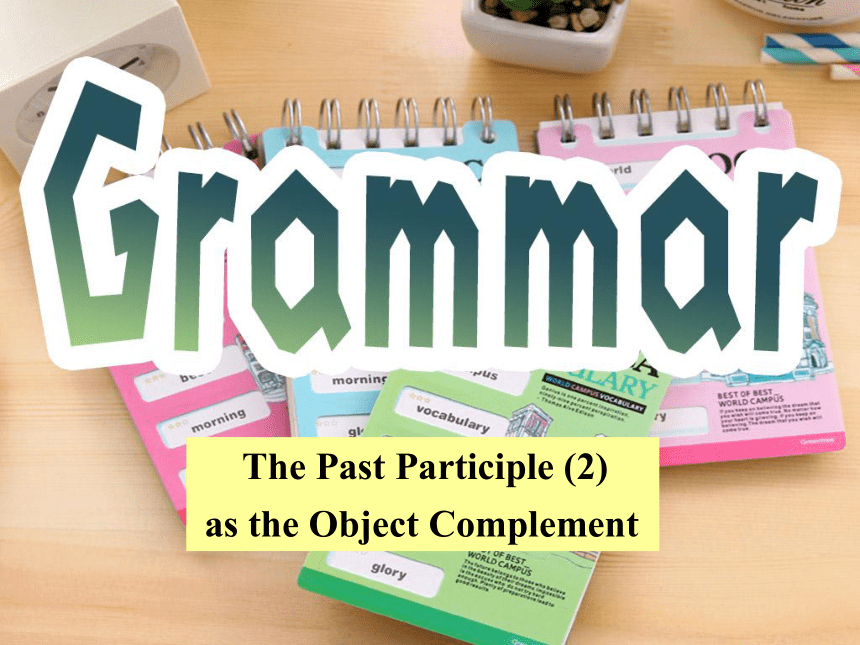
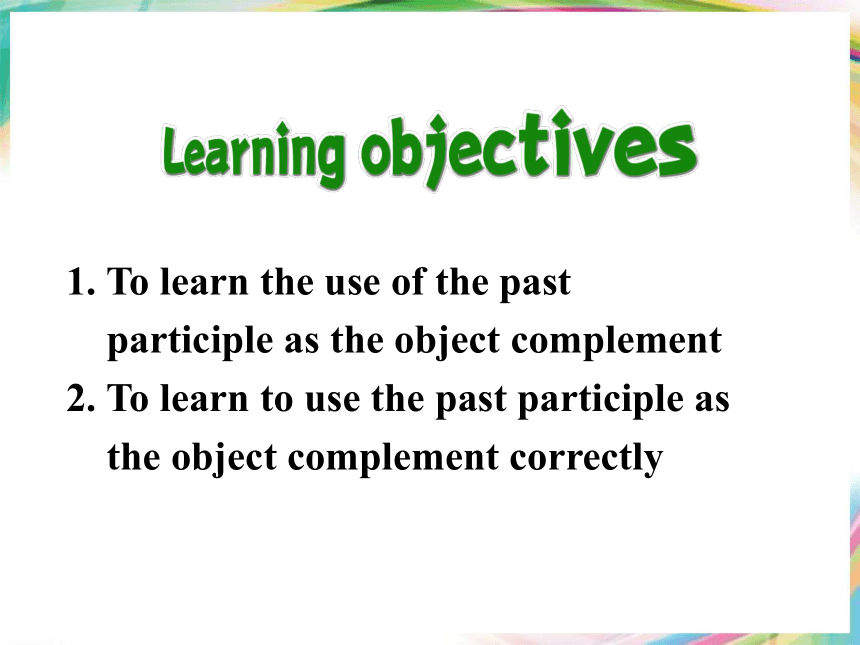

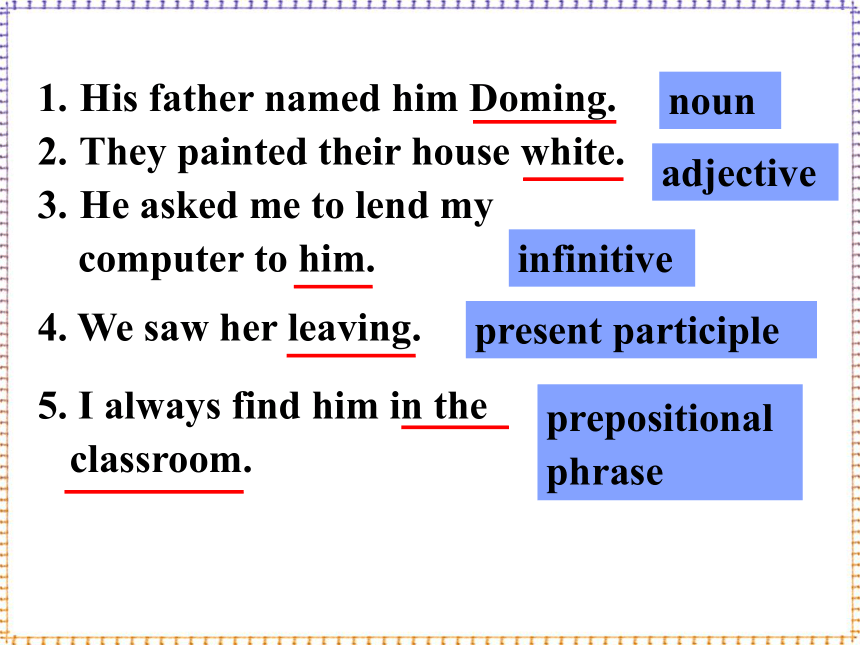
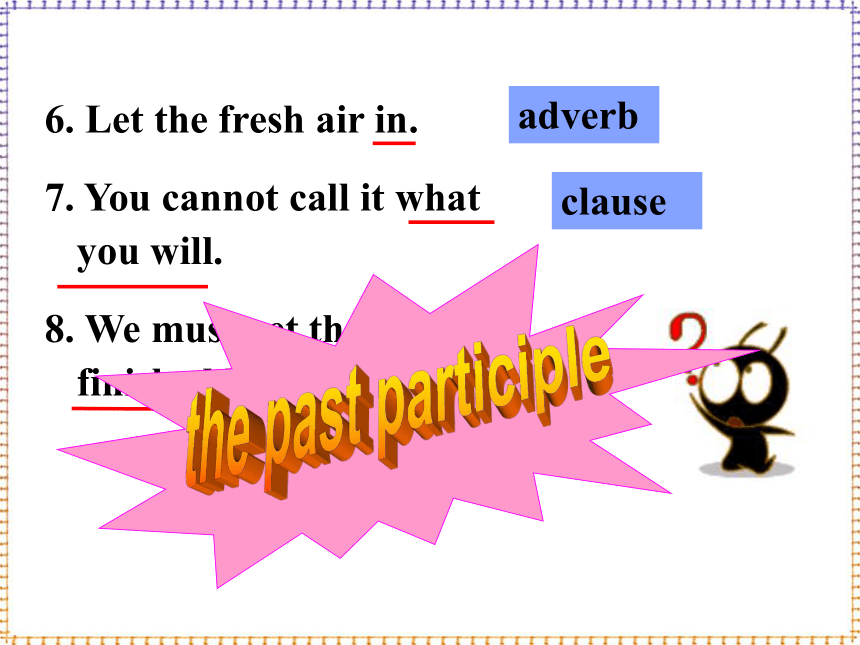
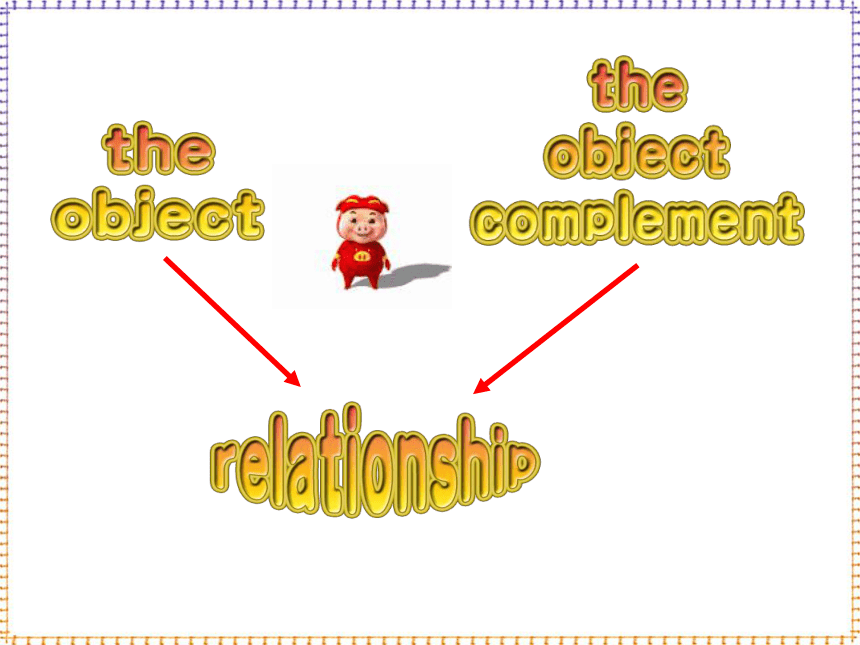
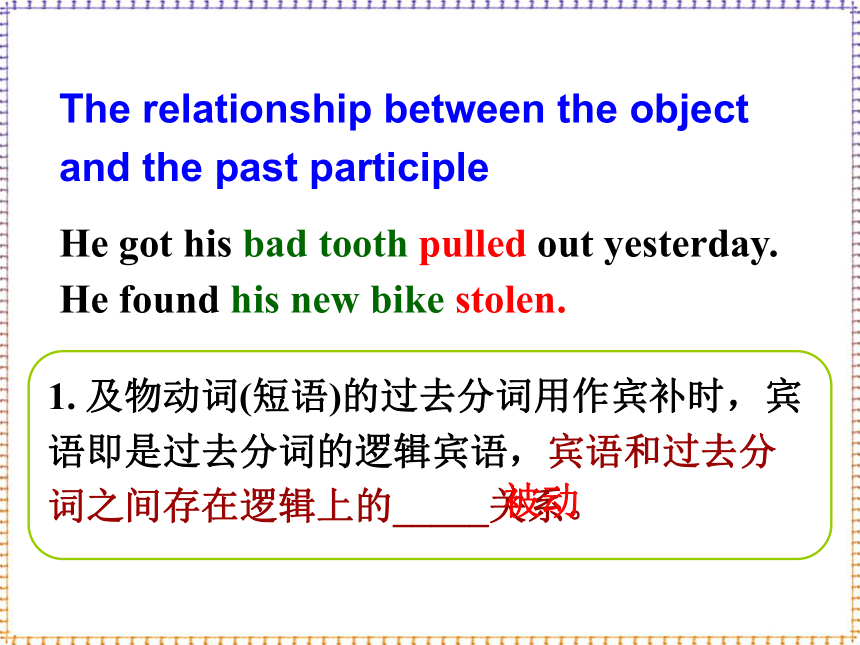

文档简介
(共29张PPT)
The
Past
Participle
(2)
as
the
Object
Complement
1.
To
learn
the
use
of
the
past
participle
as
the
object
complement
2.
To
learn
to
use
the
past
participle
as
the
object
complement
correctly
What
can
be
used
as
an
object
complement?
An
object
complement
is
a
word
or
phrase
that
follows
the
direct
object
to
modify
or
complete
its
meaning.
His
father
named
him
Doming.
They
painted
their
house
white.
He
asked
me
to
lend
my
computer
to
him.
noun
adjective
infinitive
4.
We
saw
her
leaving.
5.
I
always
find
him
in
the
classroom.
present
participle
prepositional
phrase
6.
Let
the
fresh
air
in.
7.
You
cannot
call
it
what
you
will.
8.
We
must
get
the
work
finished
by
10
o’clock.
adverb
clause
The
relationship
between
the
object
and
the
past
participle
He
got
his
bad
tooth
pulled
out
yesterday.
He
found
his
new
bike
stolen.
1.
及物动词(短语)的过去分词用作宾补时,宾语即是过去分词的逻辑宾语,宾语和过去分词之间存在逻辑上的_____关系。
被动
2.
少数不及物动词如
go,
change,
fall
等的过去分词作宾语补足语时,仅表示动作_____。因此,宾语与过去分词之间不存在逻辑上的被动关系。
I
found
the
leaves
fallen
two
days
ago.
She
found
her
necklace
gone
on
her
way
home.
完成
3.
动词seat,
hide,
dress等的过去分词作宾语补足语一般表示宾语的_____,而不表示被动或完成的意义。
On
coming
in,
I
found
a
girl
seated
in
the
corner.
I
like
her
dressed
in
red.
状态
1.
The
past
participle
as
the
object
complement
is
used
after
some
link
verbs,
such
as
keep,
leave.
e.g.
They
kept
the
door
locked
for
a
long
time.
Don’t
leave
the
windows
broken
like
this
all
the
time.
The
situation
where
the
past
participle
is
used
as
the
object
complement.
2.
The
past
participle
as
the
object
complement
is
used
after
some
causative
verbs,
such
as
get,
have,
make
etc.
Means
“the
object
is
…”
e.g.
I
have
had
my
bike
repaired.
I
raised
my
voice
to
make
myself
heard.
“have+宾语+
-ed”的几种用法:
①意为主语请别人做某事。
1)
I
have
had
my
bike
repaired.
2)
The
villagers
had
many
trees
planted
just
then.
3)
It
is
important
to
have
your
eyes
examined
regularly
to
check
for
any
sign
of
eye
disease
that
may
not
have
any
symptom.
1)
My
elder
sister
had
her
wallet
stolen
on
a
bus
last
month.
2)
The
old
man
had
his
wrist
broken
in
the
accident.
②意为主语遭遇(遭受)某一不愉快
(不测)的事情。
1)
Every
day
read
a
proverb
aloud
several
times
until
you
have
it
memorized.
2)
They
are
going
to
have
some
trees
planted
next
week.
③意为使某人完成某事,事情既可以是
别人做完,也可以由主语参与完成。
(主语自己可能参与)
3.
The
past
participle
as
the
object
complement
is
used
after
some
verbs
of
senses,
such
as
watch,
notice,
see,
hear,
listen
to,
feel,
find.
e.g.
When
we
got
to
school,
we
saw
the
door
locked.
We
can
hear
the
windows
beaten
by
the
heavy
rain
drops.
4.
The
past
participle
as
the
object
complement
is
used
after
some
verbs,
such
as
want,
wish,
like,
expect,
order.
e.g.
The
teacher
won’t
like
the
problem
discussed
at
the
moment.
I
want
the
suit
made
to
his
own
measure.
5.
The
past
participle
as
the
object
complement
is
used
in
the
structure
“with+
object
+object
complement”.
e.g.
The
thief
was
brought
in
with
his
hands
tied
behind
his
back.
With
many
brightly-coloured
flowers
planted
around
the
building,
his
house
looks
like
a
beautiful
garden.
With
the
matter
settled,
we
all
went
home.
1.
Compare
the
past
participle
used
as
the
object
complement
with
the
present
participle.
I
saw
him
_______
in
bed.
I
saw
him
_____
by
a
dog.
sleeping
bitten
I
heard
someone
_______
me.
(call)
I
heard
my
name
______.
calling
called
过去分词与宾语之间是动宾关系
现在分词与宾语之间是主谓关系
2.
Compare
the
past
participle
used
as
the
object
complement
with
the
infinitive.
With
all
the
problems
settled,
he
felt
happy.
With
many
problems
to
settle,
he
felt
worried.
过去分词强调与宾语之间的被动关系,
表示动作已完成。不定式强调动作发生的全过程、或表将来要发生的事情。
Get
into
groups
and
play
the
game
What
did
they
find?
Write
about
what
Mr.
and
Mrs.
Smith
found
when
they
came
home
from
work
one
day.
Remember
to
use
the
past
participle
as
the
object
complement.
Example:
They
found
the
window
broken.
The
first
person
in
each
group
writes
a
sentence
and
folds
the
paper
over
his/her,
so
the
next
person
cannot
see
it.
Pass
the
paper
to
the
next
person
in
the
group.
When
the
last
one
in
the
group
has
finished
writing,
he/she
comes
to
the
front
of
the
class
to
read
all
the
ideas
of
his/her
group.
The
one
with
the
most
interesting
ideas
wins.
Ⅰ.
用括号内动词的正确形式填空。
1.
She
wants
her
paintings
________
(display)
in
the
gallery,
but
we
don’t
think
they’d
be
popular.
2.
I’d
like
your
bedroom
________
(tidy)
before
I
get
home
from
work.
It’s
a
terrible
mess.
3.
I’ll
get
the
house
________
(clean)
if
you
cook
the
dinner.
displayed
tidied
cleaned
4.
When
they
had
it
________
(explain)
to
them
again,
the
students
could
understand
the
point
of
the
experiment.
5.
The
woman
left
him
________
(wait)
outside
in
the
rain
for
an
hour.
explained
waiting
Ⅱ.
根据括号内的汉语提示补全下面句子(每空一词)。
1.
Our
car
________
________
(坏了)
and
we
had
to
push
it
off
the
road.
2.
No
one
could
ever
________
________
________
________
________
________
(代替她父亲).
3.
Last
night,
she
________
________
________
________
________
(与露西吵了一架)
about
who
should
do
the
housework.
broke
down
take
the
place
of
her
father
had
a
quarrel
with
Lucy
4.
He
________
________
________
________
(捡起了他的帽子)
from
the
floor
and
put
it
back
on
his
head.
picked
up
his
hat
1.
Finish
exercises
2
on
page
13.
2.
Finish
exercises
1
and
2
on
page
50.
The
Past
Participle
(2)
as
the
Object
Complement
1.
To
learn
the
use
of
the
past
participle
as
the
object
complement
2.
To
learn
to
use
the
past
participle
as
the
object
complement
correctly
What
can
be
used
as
an
object
complement?
An
object
complement
is
a
word
or
phrase
that
follows
the
direct
object
to
modify
or
complete
its
meaning.
His
father
named
him
Doming.
They
painted
their
house
white.
He
asked
me
to
lend
my
computer
to
him.
noun
adjective
infinitive
4.
We
saw
her
leaving.
5.
I
always
find
him
in
the
classroom.
present
participle
prepositional
phrase
6.
Let
the
fresh
air
in.
7.
You
cannot
call
it
what
you
will.
8.
We
must
get
the
work
finished
by
10
o’clock.
adverb
clause
The
relationship
between
the
object
and
the
past
participle
He
got
his
bad
tooth
pulled
out
yesterday.
He
found
his
new
bike
stolen.
1.
及物动词(短语)的过去分词用作宾补时,宾语即是过去分词的逻辑宾语,宾语和过去分词之间存在逻辑上的_____关系。
被动
2.
少数不及物动词如
go,
change,
fall
等的过去分词作宾语补足语时,仅表示动作_____。因此,宾语与过去分词之间不存在逻辑上的被动关系。
I
found
the
leaves
fallen
two
days
ago.
She
found
her
necklace
gone
on
her
way
home.
完成
3.
动词seat,
hide,
dress等的过去分词作宾语补足语一般表示宾语的_____,而不表示被动或完成的意义。
On
coming
in,
I
found
a
girl
seated
in
the
corner.
I
like
her
dressed
in
red.
状态
1.
The
past
participle
as
the
object
complement
is
used
after
some
link
verbs,
such
as
keep,
leave.
e.g.
They
kept
the
door
locked
for
a
long
time.
Don’t
leave
the
windows
broken
like
this
all
the
time.
The
situation
where
the
past
participle
is
used
as
the
object
complement.
2.
The
past
participle
as
the
object
complement
is
used
after
some
causative
verbs,
such
as
get,
have,
make
etc.
Means
“the
object
is
…”
e.g.
I
have
had
my
bike
repaired.
I
raised
my
voice
to
make
myself
heard.
“have+宾语+
-ed”的几种用法:
①意为主语请别人做某事。
1)
I
have
had
my
bike
repaired.
2)
The
villagers
had
many
trees
planted
just
then.
3)
It
is
important
to
have
your
eyes
examined
regularly
to
check
for
any
sign
of
eye
disease
that
may
not
have
any
symptom.
1)
My
elder
sister
had
her
wallet
stolen
on
a
bus
last
month.
2)
The
old
man
had
his
wrist
broken
in
the
accident.
②意为主语遭遇(遭受)某一不愉快
(不测)的事情。
1)
Every
day
read
a
proverb
aloud
several
times
until
you
have
it
memorized.
2)
They
are
going
to
have
some
trees
planted
next
week.
③意为使某人完成某事,事情既可以是
别人做完,也可以由主语参与完成。
(主语自己可能参与)
3.
The
past
participle
as
the
object
complement
is
used
after
some
verbs
of
senses,
such
as
watch,
notice,
see,
hear,
listen
to,
feel,
find.
e.g.
When
we
got
to
school,
we
saw
the
door
locked.
We
can
hear
the
windows
beaten
by
the
heavy
rain
drops.
4.
The
past
participle
as
the
object
complement
is
used
after
some
verbs,
such
as
want,
wish,
like,
expect,
order.
e.g.
The
teacher
won’t
like
the
problem
discussed
at
the
moment.
I
want
the
suit
made
to
his
own
measure.
5.
The
past
participle
as
the
object
complement
is
used
in
the
structure
“with+
object
+object
complement”.
e.g.
The
thief
was
brought
in
with
his
hands
tied
behind
his
back.
With
many
brightly-coloured
flowers
planted
around
the
building,
his
house
looks
like
a
beautiful
garden.
With
the
matter
settled,
we
all
went
home.
1.
Compare
the
past
participle
used
as
the
object
complement
with
the
present
participle.
I
saw
him
_______
in
bed.
I
saw
him
_____
by
a
dog.
sleeping
bitten
I
heard
someone
_______
me.
(call)
I
heard
my
name
______.
calling
called
过去分词与宾语之间是动宾关系
现在分词与宾语之间是主谓关系
2.
Compare
the
past
participle
used
as
the
object
complement
with
the
infinitive.
With
all
the
problems
settled,
he
felt
happy.
With
many
problems
to
settle,
he
felt
worried.
过去分词强调与宾语之间的被动关系,
表示动作已完成。不定式强调动作发生的全过程、或表将来要发生的事情。
Get
into
groups
and
play
the
game
What
did
they
find?
Write
about
what
Mr.
and
Mrs.
Smith
found
when
they
came
home
from
work
one
day.
Remember
to
use
the
past
participle
as
the
object
complement.
Example:
They
found
the
window
broken.
The
first
person
in
each
group
writes
a
sentence
and
folds
the
paper
over
his/her,
so
the
next
person
cannot
see
it.
Pass
the
paper
to
the
next
person
in
the
group.
When
the
last
one
in
the
group
has
finished
writing,
he/she
comes
to
the
front
of
the
class
to
read
all
the
ideas
of
his/her
group.
The
one
with
the
most
interesting
ideas
wins.
Ⅰ.
用括号内动词的正确形式填空。
1.
She
wants
her
paintings
________
(display)
in
the
gallery,
but
we
don’t
think
they’d
be
popular.
2.
I’d
like
your
bedroom
________
(tidy)
before
I
get
home
from
work.
It’s
a
terrible
mess.
3.
I’ll
get
the
house
________
(clean)
if
you
cook
the
dinner.
displayed
tidied
cleaned
4.
When
they
had
it
________
(explain)
to
them
again,
the
students
could
understand
the
point
of
the
experiment.
5.
The
woman
left
him
________
(wait)
outside
in
the
rain
for
an
hour.
explained
waiting
Ⅱ.
根据括号内的汉语提示补全下面句子(每空一词)。
1.
Our
car
________
________
(坏了)
and
we
had
to
push
it
off
the
road.
2.
No
one
could
ever
________
________
________
________
________
________
(代替她父亲).
3.
Last
night,
she
________
________
________
________
________
(与露西吵了一架)
about
who
should
do
the
housework.
broke
down
take
the
place
of
her
father
had
a
quarrel
with
Lucy
4.
He
________
________
________
________
(捡起了他的帽子)
from
the
floor
and
put
it
back
on
his
head.
picked
up
his
hat
1.
Finish
exercises
2
on
page
13.
2.
Finish
exercises
1
and
2
on
page
50.
